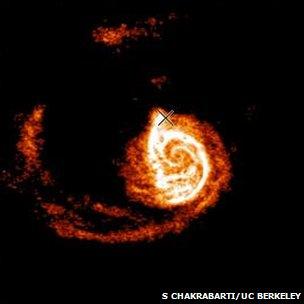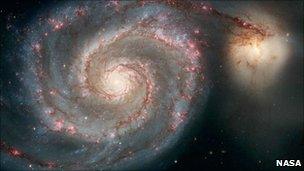Milky Way's dark-matter satellite in stargazers' sights
- Published

The hydrogen gas in the farthest reaches of spiral galaxies may hold hints of dark-matter galaxies
Scientists have proposed a means to track down the dark dwarf galaxies that should be orbiting the Milky Way, saying they have found evidence of one.
Spiral galaxies like ours have these satellites, but some are made of "dark matter" that is impossible to see.
The idea is to look for tracks they leave in hydrogen gas at the galaxy's edge, like the wake behind a boat.
Observations based on the idea suggest the existence of a far-flung satellite galaxy weighing up to 10 billion Suns.
Presenting her work at the American Astronomical Society meeting in Seattle, external, Sukanya Chakrabarti, from the University of California, Berkeley, said her method could solve a long-standing problem in cosmology.
Around our Milky Way are a number of satellite galaxies - these and other galaxies form the Local Group that is our conurbation in the cosmos.
However, theory predicts that there should be far more satellites orbiting the Milky Way.
What may account for these missing galaxies is that they are composed overwhelmingly of dark matter - a mysterious counterpart to matter that is believed to make up 85% of matter in the Universe.
But dark matter does not interact with light and cannot be seen down a telescope like normal matter - it is known only because it exerts gravitational forces on matter we can see.
But Dr Chakrabarti explained one aspect of the dark matter theory that is lacking.
"One of the current outstanding problems in cosmology is there's this missing satellites problem," she told the BBC.
The current dark matter theory, she said, "is very successful at recovering the large-scale distribution of galaxies, but when you look on sub-galactic scales, it far overpredicts the number of dwarf galaxies relative to what we actually observe".
"So we wanted to develop a method that allows you to find very dim dwarf galaxies without having to see them directly."
'Galaxy X'
Dr Chakrabarti and her colleagues hope to exploit dark matter's indirect effects to solve the conundrum, by using radio telescopes to carefully analyse disturbances in the vast clouds of hydrogen gas at the farthest reaches of the Milky Way.

The Whirlpool Galaxy is a spiral galaxy with an easily-seen satellite
A dark matter-dominated galaxy passing through the gas, she said, should leave ripples in the dust that are an indication of not only where the galaxy is, but how big it is.
The method has already been successfully tested out on galaxies that have visible satellites, including the famous Whirlpool Galaxy, as Dr Chakrabarti explains in a paper that will be published in the Astrophysical Journal, external.
Using the method, Dr Chakrabarti found a set of ripples that indicate a comparatively huge satellite galaxy, 260,000 light-years from the centre of the galaxy.
The satellite - dubbed Galaxy X in deference to the 19th-Century discovery of Neptune that named it Planet X - should weigh between three and 10 billion times as much as the Sun, about a hundredth as much as the Milky Way itself.
Now all that remains is to confirm it. That will have to wait until Dr Chakrabarti's collaborators are granted time to use the Spitzer Space Telescope.
"This is the first time in my work that I've really gone out on a limb and made a very specific prediction - I didn't give myself any elbow room," Dr Chakrabarti told the meeting.
"If we're right, then it's a huge success and you can find very dim or effectively dark galaxies simply by analysing disturbances in the gas disk."
Dr Chakrabarti said that the method should work for far smaller dwarf galaxies - down to a thousandth the mass of the Milky Way.
Pending the granting of time on Spitzer, the many proposed dark and mysterious galaxies surrounding our Milky Way could be spotted later this year, and a big problem in cosmology could be neatly solved.
- Published13 January 2011
- Published13 January 2011
- Published11 January 2011
- Published7 September 2010